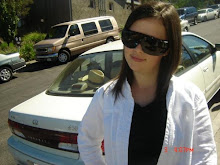 After deciding that I wanted to read one of my suggested books, I chose this title from that list basically at random. I hadn't saved the e-mail from the family friend that suggested it, so I couldn't really remember why she liked it and thought I should give it a try. So I started reading this one without knowing much about it except that it was in the Young Adult section at the library. The book jacket copy was no help -- Colin read it, and said it was the worst book jacket copy he'd ever seen. I wasn't that surprised when it took some time to get invested in the story.
After deciding that I wanted to read one of my suggested books, I chose this title from that list basically at random. I hadn't saved the e-mail from the family friend that suggested it, so I couldn't really remember why she liked it and thought I should give it a try. So I started reading this one without knowing much about it except that it was in the Young Adult section at the library. The book jacket copy was no help -- Colin read it, and said it was the worst book jacket copy he'd ever seen. I wasn't that surprised when it took some time to get invested in the story.This story is told in a series of letters between two cousins, Cecilia and Kate. The year is 1817 and Kate is making her social debut in London while Cecilia is at home in the English countryside. At first, they describe commonplace occurrences to each other, complaining about their siblings and deciding what dress to wear to which party. However, in their world magic and sorcery are accepted facts of life. The young cousins soon become entangled in a complicated web of competition and deceit amongst a dashing wizard and a ruthless witch and wizard who are attempting to rob him of his powers. Keeping each other apprised of events and advising each other on courses of action through their letters, Cecilia and Kate manage to defeat their enemies -- and become engaged to the men they love.
I was surprised at how invested I eventually became. While I wouldn't really call this book a page-turner, I really did want to know what was going to happen and how all of the events were connected. I grew more comfortable with the letter format as I read, but it's not something I prefer. I am the type of person that sets a book down once I've ended a chapter -- and there were no chapters in this book! I kept setting it down after one letter ended and having to back up a few pages to remind myself of what was going on before starting the next letter. I also had some trouble keeping track of the many secondary characters, although it was easier by the last third of the book.
I appreciated the Authors' Note at the end of the book, although I almost wish that I had read it first. Wrede and Stevermer didn't set out to write a book together, this project started as a writing exercise -- a game, really. They took turns writing letters in character to each other, never discussing plot points in person. Once their game was over, they went back and read through the story. They edited and made some changes, but the book is entirely representative of their game. This made complete sense to me. I think it explains why the beginning is a little slow, and hard to get into. The two authors seem to be very compatible; the overall tone of the book was really very cohesive. It would have been easy for two characters who know each other intimately to fall into the short-hand of their friendship and leave out details, but for the most part Wrede and Stevermer did a good job of including exposition naturally.
I would recommend this book, although I recommend reading the Authors' Note first! Also, it really is appropriately YA. If there's a young girl in your life who enjoys fantasy novels, I think she should give this one a try. (Boys will probably want to skip it -- there's a lot of girly stuff about dresses and courting and stuff.)




















